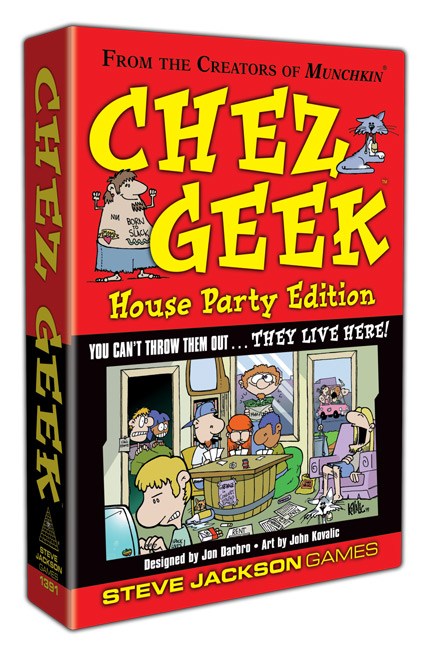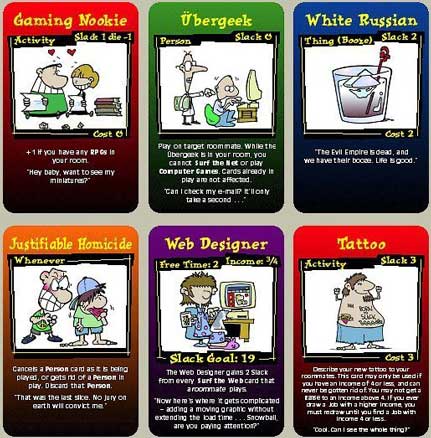Chez Geek
Origins Award: Best Card Game in 2000
Chez Geek is a card game that is treated humorously living in a shared flat ( WG). The players try to collect as many as possible by playing off positive ticket points that represent the achievement of a more relaxed life. The original English comes from Steve Jackson Games, and was first published in 1999, a German edition has been published since 2004 by Pegasus Games. Also in some other language areas appeared translations. In addition, some extensions and only playable variants were published, except for small changes keep the gameplay, but move in a different environment, respectively.
2000 won Chez Geek the Origins Award in the category " Best Traditional Card Game " (Best Traditional Card Game ), 2003, there was the Origins Award for "Best Graphic Representation of a Card Game Product" ( best card game graphics) for the extension " Chez Greek ".
The principal developer of Chez Geek were Jon Darbro and Alain H. Dawson, Steve Jackson and Russell Godwin involved in the development. On the extensions a few other game designers have worked. The cards of the base game and most of the extensions were drawn by John Kovalic.
Gameplay
At Chez Geek, each player takes the role of a roommate in an apartment. The characters are geeks who indeed pursue a career defined by maps, but where it mainly comes to lead a leisurely and fun life. This is reflected in the game goal the gathering as many so-called Slack- points, which act as victory points.
The players are in turn the train. Who is on the train, pulling cards from a face-down pile. With these cards, it may be "persons", "things" and " activities ". Plays of the players from these, many of them bring him a Slack- points. Others allow special actions or have other side effects. The profession which the character is just exercising, determines how many things and activities a player can play per round. Most cards will remain for the rest of the game if they are not removed by some other action, are the players. There are so-called " Each time cards ", where specific actions can be performed and can also harm their opponents. Cards with negative effects can also be played on enemy characters to harm them. The winner is the player who reaches first a certain amount of slack points.
For some events during the game, a six-sided dice will be used. The Slack- points keep track of can be confusing as the game progresses through random values and modifiers, so the developers recommend to use tiles, glass beads or other small objects as counters.
The only playable versions of the game series about essentially take this basic concept, but convert it from by adding rules. With the exception of "Chez Guevara " these variants, however, are all compatible with each other and with the basic game, so you can mix together all the cards and use it as a game, in which the additional rules then supplement.
The cards each showing the game variant information, a drawing in cartoon style and a humorous comment or quote. The main game has 110 cards.
English extensions and variants
- Chez Geek 2 - Slack Attack: 2000 published; Development Darbro, Dawson, Jackson and Godwin, illustrations Kovalic, Cover Philip Reed; 56 cards
Expansion with additional cards for the base game.
- Chez Geek 3 - Block Party: 2001 published; Development Darbro, Dawson, Jackson and Godwin, illustrations Kovalic, Cover Philip Reed; 56 cards
Expansion with additional cards for the base game.
- Chez Greek: 2002 published; Development and Andrew Jackson Hackard, illustrations Kovalic; 112 cards
Stand-alone game. As background, the fraternities and sororities serve at American universities. The "Greek " in the title is a nod to their Greek names and related customs.
Stand-alone game. The background showing the U.S. Army, the " Grunt " in the title is a colloquial term for an infantryman.
- Chez Goth: 2004 published; Development Jackson, illustrations Kovalic; 112 cards
Stand-alone game. As background, the Goth subculture serves.
- Chez Guevara: 2006 published; Development Jackson and Giles Schildt, illustrations, Greg Hyland, 112 cards
Stand-alone game. As background, communist revolutionaries serve the Latin American jungle, the title alludes to Che Guevara on. Chez Guevara is the first variant is not suitable by stronger rule changes for combination with the other variants, but the replacement of individual cards is possible.
- Chez Cthulhu: publication planned in 2009; Development Jackson, illustrations Kovalic; 112 cards
Stand-alone game. As the background based on the works of HP Lovecraft Cthulhu Mythos serves.
Furthermore, released in 2001 the game Chez Dork, which was developed by Steve Jackson and illustrated by John Kovalic. It is based on Kovalics Dork Tower webcomic, but has a different from the rest of Chez- row game concept, despite the similarity in name.
German extensions and variants
Pegasus Games published essentially direct translations of the original games. However, the two extensions of the main game were summarized in an issue. Also, the publication order of the variants differs. In some publications contain additional cards, which did not exist in the original English.
- "Chez Geek 2: Block Party ": 2005 published; German summary of " Slack Attack" and " Block Party "; 112 cards
- "Chez Goth": 2006 published; German version of the corresponding English version; 112 cards
- "Chez Genius: The student apartment ": released in 2007; German version of " Chez Greek"; 118 cards
- "Chez Guevara ": 2009 published; German version of the corresponding English version; 112 cards
- "Chez Cthulhu": 2010 published; German version of the corresponding English version; 112 cards
Promo items
As with the related Munchkin series distribute the Chez Geek Games Publisher at fairs, conventions and other events, promotional items such as add-on cards and bookmarks that can be used in games.









